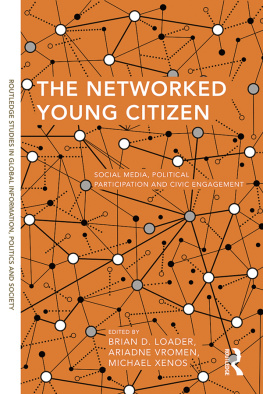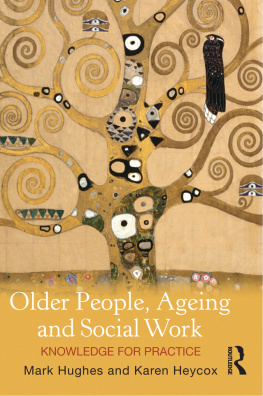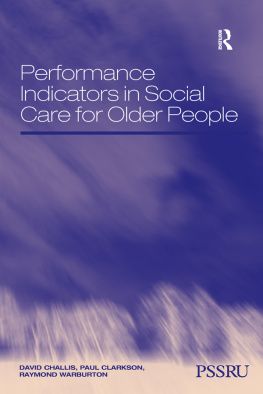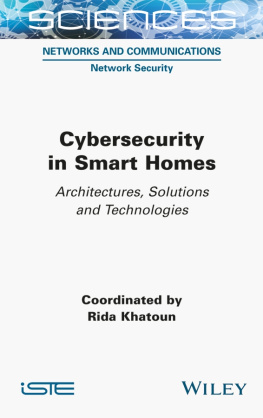Digital Welfare for the Third Age
This book is about the ways in which digital technology can contribute to the welfare of older people. The Internet, mobile phones and other technologies have changed how we live and work. Such technologies also shape how services for older people are organised in ways that potentially place carers and older people at the centre of service provision. Telecare can make homes smart so that they are more comfortable and less risky for people who can take advantage of devices that help make them independent members of their community.
Digital welfare is part of the broader project in Britain and elsewhere to adopt new information and communications technologies (ICTs) to organise and deliver health and social welfare services. This includes mundane technologies such as an alarm to call for help to complex telecare smart homes and electronic patient records. The intended and unintended consequences of such new technologies must be explored if we are to benefit from these innovations. Based on recent research, this book seeks to highlight and examine the new opportunities and dilemmas that confront older people and all those concerned with their welfare in the network society.
This edited collection provides original contributions from leading academics and researchers in the field to access the evidence for improved professional integration and user-centred health and social care services for older people arising from health informatics. Digital Welfare for the Third Age will be of interest to all those working with older people.
Brian D. Loader is Co-Director of the Social Informatics Research Unit, Department of Sociology, University of York.
Michael Hardey is Reader in Sociology at the Hull/York Medical School and the Department of Social Sciences at the University of Hull.
Leigh Keeble is a Development Officer in local government, and previously a Research Fellow at the University of York.
Digital Welfare for the Third Age
Health and social care informatics for older people
Edited by
Brian D. Loader, Michael Hardey and Leigh Keeble
First published 2009
by Routledge
2 Park Square, Milton Park, Abingdon, Oxon OX14 4RN
Simultaneously published in the USA and Canada
by Routledge
270 Madison Avenue, New York, NY 10016
Routledge is an imprint of the Taylor & Francis Group, an informa business
This edition published in the Taylor & Francis e-Library, 2008.
To purchase your own copy of this or any of Taylor & Francis or Routledges collection of thousands of eBooks please go to www.eBookstore.tandf.co.uk.
2009 selection and editorial matter, Brian D. Loader, Michael Hardey and Leigh Keeble; individual chapters, the contributors
All rights reserved. No part of this book may be reprinted or reproduced or utilised in any form or by any electronic, mechanical, or other means, now known or hereafter invented, including photocopying and recording, or in any information storage or retrieval system, without permission in writing from the publishers.
British Library Cataloguing in Publication Data
A catalogue record for this book is available from the British Library
Library of Congress Cataloging in Publication Data
Digital welfare for the third age : health and social care informatics for older people / edited by Brian D. Loader, Michael Hardey, and Leigh Keeble.
p. ; cm.
Includes bibliographical references.
1. Medical telematics. 2. GeriatricsData processing. 3. Older people Services for. I. Loader, Brian, 1958- II. Hardey, Michael. III. Keeble, Leigh.
[DNLM: 1. Telemedicine. 2. Aged. 3. Health Services for the Aged. 4. Information Systems. 5. Internet. 6. Self-Help Devices. WT 26.5 D574 2009]
R119.95D54 2009
025.06061dc22 2008023709
ISBN 0-203-88653-4 Master e-book ISBN
ISBN10: 0-415-45408-5 (hbk)
ISBN10: 0-415-45409-3 (pbk)
ISBN10: 0-203-88653-4 (ebk)
ISBN13: 978-0-415-45408-7 (hbk)
ISBN13: 978-0-415-45409-4 (pbk)
ISBN13: 978-0-203-88653-3 (ebk)
Illustrations
Tables
A typology of informatisation
Sample numbers by region
Professional affiliation by region
Pilot project participant characteristics and sensors installed
Nielsens (1993) categories of system acceptability and related focus group themes
Participants additional suggestions for useful devices
Participants characteristics
Summary of sensors installed in the flats
Participants8217; attitudes to technology
Ages of the people involved as well as the relative weighting of each individual service area in December 2007
Examples of the particular canonical character of telephone openings
Figures
Rings of care partnership model (from Philip 2007)
The trough of certainty
The delegation and repositioning of uncertainty to users
Plan of Miss Evans flat showing the location of sensors
Hierarchy of sensors
Location of Miss Evans217; fall detector
Location of Mr Heatons fall detector
Box
The Promise of Telemonitoring
Contributors
Sue Baines is Reader in Social Policy in the Research Institute for Health and Social Change at Manchester Metropolitan University (MMU). Sue joined MMU in summer 2007. Prior to that, she was a principal researcher working in the Institute for Policy and Practice at Newcastle University. She has many years experience of working in multidisciplinary research environments to deliver applied social research. She has managed projects from sponsors including the Economic and Social Research Council (ESRC), the Joseph Rowntree Foundation, the Department of Communities and Local Government, and Arts Council England. Sue has published widely on aspects of small enterprise, social inclusion, livelihoods and unpaid work.
Sue came to academia as a doctoral student in CURDS (Centre for Urban and Regional Development Studies) at Newcastle University under the auspices of PICT (Programme on Information and Communication Technologies). She completed an ESRC post-doctoral fellowship in 1999 which examined the experiences of employees who turned to self-employment during the restructuring of the UK print and broadcast media. Since then, she has undertaken studies of marginal self-employment, creative livelihoods and, more recently, volunteering. She joined the Social and Business Informatics (SBI) team at Newcastle University Business School in 2003 to take on the role of managing the evaluation component of a national e-government project known as FAME (Framework for Multi-Agency Environments). She has an ongoing interest in public services and their continued reliance on unpaid work (within and beyond the household). Her particular interest within this domain is in the increasingly prominent role of the third sector in public policy and service delivery. See http://www.mmucfe.co.uk/people/drsusanbaines/.
Julienne Hanson is Professor of House Form and Culture at the Bartlett, University College London, where she has been a teacher and researcher since 1975. Her research has included profiling the UKs housing stock with the needs of older people in mind, investigating the layout and design of residential care homes in relation to quality of life issues and studying the housing, support and care needs of both older people with visual impairments and the housing and support needs of people of working age with impaired sight. She has recently completed research into mainstreaming telecare services in the homes of older people, remodelling sheltered housing and residential care homes to extra care housing and ways of designing the public open spaces of residential areas so as to minimise antisocial behaviour.







